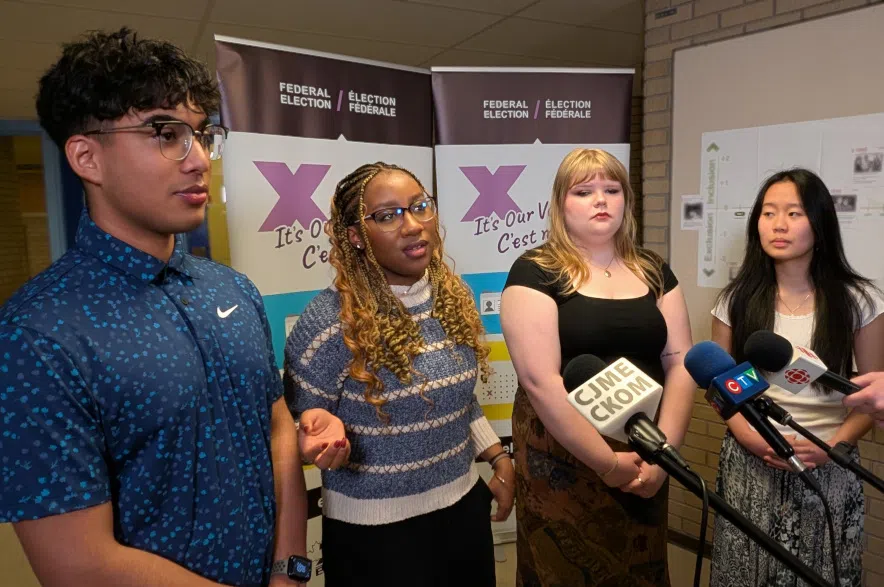Some of them can’t vote in the federal election, but dozens of Grade 12 students in Regina got to cast a ballot this spring anyway.
Luther College High School and Michael A. Riffel High School both participated in an Elections Canada pilot project to get youth more engaged in elections.
Read More:
- ‘This is an emergency’: Regina Humane Society struggling with dog capacity issues
- The final stretch: Evan Bray’s political panel on key issues
- Who’s running in my riding? Saskatchewan’s federal election candidates
Leiyanne Nepacena ran as a candidate in her class at Riffel. She ran on increasing awareness of the student supports at school for mental health and family issues. She said there was another candidate with more friends in the class, so she knew she wouldn’t win on her speech alone.
“So what I did was I made cupcakes the day of, and that really got me a lot of votes,” she said with a laugh.
Nepacena said it made her aware that voters can sometimes be easily influenced or manipulated by candidates.
At Luther, Zahin Jeena ran as a candidate in his class’s election for the Zahin Democratic Party.
“Our main cause was the course selection at Luther, so we talked about how course selection’s not as diverse as it should be,” he explained.
Jeena said that the vote ended up in a tie.
“It was because four votes did not count because I coloured outside the box,” he admitted.
Avril Hatitchki said she cast her vote for Jeena at Luther.
“For me it was really interesting deciding ‘will I be willing to vote for them and settle for this not happening? Or this?’ You know, was I willing to compromise or just kind of stay in the one party,” she said, explaining she felt it was like the real world system.
Cali Cloutier went through the learning module with her class at Riffel, but didn’t get to participate in an election. She said she really enjoyed the process and it helped prepare her for the current election.
“I just cast my first vote this year, so it was really exciting to actually understand how the process works instead of just filling in a ballot and not knowing what happens after that,” said Cloutier.
The classes were taught by Nick Helliwell an Indigenous Elder employed by Elections Canada, and Gwen Keith, an educator with Elections Canada.
With the short election campaign, they said they had to hit the ground running when the writ dropped. They contacted the school administrations, went through the material, and then got into the classrooms – only ending up with eight days to be in-person with students.
“Some exciting things happened (in the mock elections) and there were some surprises, as there are in elections. And we were able to discuss how these things play out in the real polls,” explained Helliwell.
He said they tried to get across the importance of youth getting involved in the democratic process.
“(Tried to help) the students understand their place in Canada as citizens, as active engaged citizens who take the electoral process seriously,” he said.
In the 2021 election, the voter turnout for people 18-24 was 46.7 per cent, which was more than 7 per cent lower than the election before that.
Gwendolyn Friedrich, returning officer for the Regina-Lewvan riding, said Elections Canada recognized that for democracy to remain strong, they need to engage young voters.
“It is a concern when we look at how is democracy going to look going forward. We need young people to be engaged and involved, and we need to discover what is the apathy? What is the reason that they don’t feel involved?” said Friedrich.
She said the Exploring Democracy project has been developed over several years by Elections Canada, but this is the first time it’s been used in Saskatchewan.











